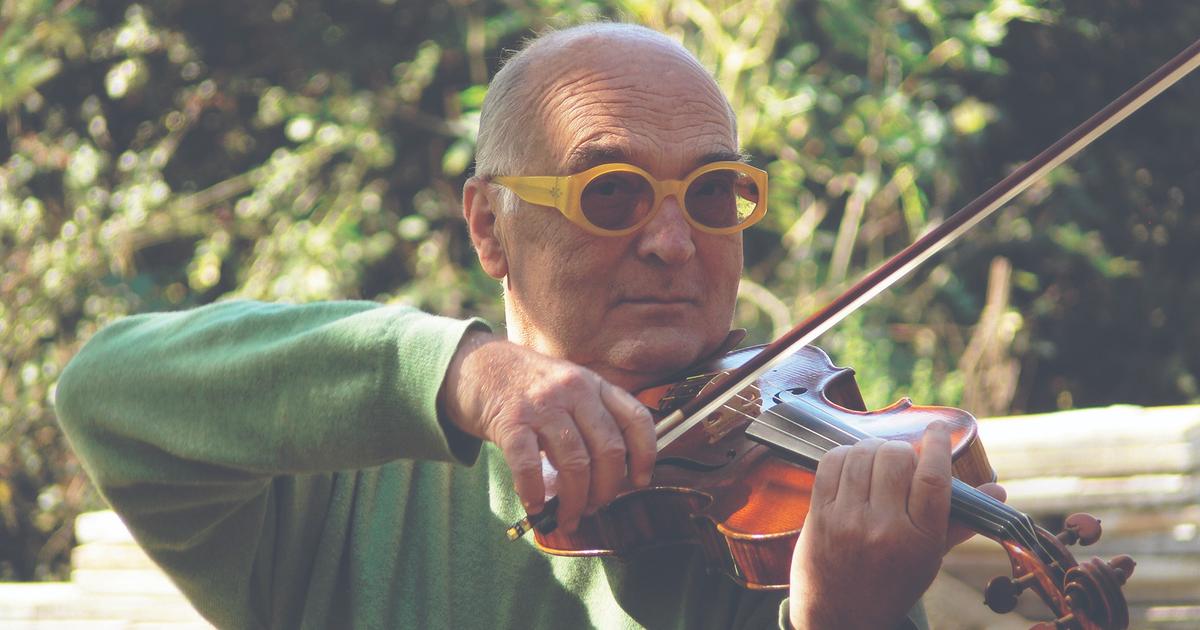There are more Fidelmichel in pop than one can be fond of. Nerds like Owen Pallett, poets like Laurie Anderson, but also guys like Nigel Kennedy and David Garrett, rather unspeakable horsehair splitters from the crossover classics. They all scratch very differently about noble gut strings. But they have one thing in common: they are pretty white-bread.
Brittney Denise Parks appearance: no daughter from a higher home, no graduate of various music colleges with graduate collective delusions. Parks comes from a strictly religious family, who ended up having to invest the money for one-to-one lessons in new shoes for her and her twin sister. Nevertheless, she is now playing the first violin in pop under the stage name Sudan Archives, on her own terms.
The 25-year-old American describes herself as a "one-woman band violinist". The handling of her instrument she has acquired mainly autodidactic. She was less inspired by Paganini legends than Fiddlers from the north and west of Africa. "It's a kind of love-hate relationship," she says in an interview about her relationship to the violin. "We are very close, it is almost like an extension of my body."
Parks does not play her instrument under the chin, but plucks or humming it like a guitar and plugs it into various sound benders. From the corpus she taps rhythms and sends them into hypnotic loops, underpinned by an open understanding of soul, hip-hop and the nebulous electronica of the West Coast. She sings with a voice that sometimes melts between the sounds like Sade's. All this adds up to the special pizzicato jive that can now be heard on "Athena", the first album by Sudan Archives.
Price query time:
29.10.2019, 10:49 clock
No guarantee
DISPLAY
Sudan Archives
Athena
label:
Pias / Stones Throw (Rough Trade)
Price:
EUR 9.99
Buy from Amazon Buy from Thalia
Product information is purely editorial and independent. The so-called affiliate links above, we usually receive a commission from the dealer when buying. More information here.
"Instead of an orchestra, I have electronic devices around me," says Parks, "instead of playing Beethoven, I make my own compositions." You are a little wrong, if you just want to nail them to the Gefiedel. But with her violin, Parks does something outrageous: she makes the university torture instrument par excellence the center of resonance for African-American history.
The "Archives" does not carry them in the name for no reason; Sudan was called her because she did not like the name Brittney when she was a child. She finds it conclusive when her music is perceived as the echo of Afrofuturism: as part of a long tradition when it comes to designing alternative future scenarios for the black community - and to shaping the present. "I'm an Afrofuturist by nature, that's not something I could control," Parks says.
Alex Black
Musician Sudan Archives: "I am naturally Afrofuturistic"
With the violin in hand, nobody else is reaching for the stars and the deliverance they promise. And yet the music of Sudan Archives is almost ideal typical of a movement within the Afro-American scene that ranges from the solitary as well as traditional soul of a Solange Knowles to the jazz genealogy of Matana Roberts and also finds itself in the fine arts, such as in works of Arthur Jafa. Tradition lines, which are overlaid in history by other, white hegemonies, are here again and again rediscovered and asserted.
Brittney Parks lives in Los Angeles today, but grew up in Cincinnati, Ohio, especially in the church. It still describes itself today as religious, but makes, in contrast to certain other pop stars, no big fuss about it. Stepping away from her Christian family determined large parts of her life. "There is a place that I call home, but it's not where I am welcome," she sings in "Confessions", a central song on "Athena". The line is based on experiences in her parents' home.
Against this background, and since the omens are now clearly on pop career, parks are all the more offensive the self-confident violin vamp. In the video for "Glorious" she throws herself in Nicki-Minaj poses - with the violin bow at the ready. "I use my violin like a sword to beat back my enemies," she says. "But also like a bait to attract people, and I try to make sense of myself."
Parks had caused a stir three years ago with a recast of "King Kunta", a hit by rapper Kendrick Lamar. "Black woman taking no losses", said in her version, and accordingly, the song was renamed "Queen Kunta". She performed it alone with her violin and a loop station in a living room setting, rather clicker-clacker classic than hip-hop. It was a feminist appropriation, a revolt with the means of the Biedermeier. And thus a kind of anticipation of what Sudan Archives now also celebrated on major festival stages such as Coachella or at a birthday serenade for Yoko Ono in Los Angeles.
Tim Mosenfelder / Getty Images
Sudan Archives at a concert in Oakland (2018): Revolt with the means of Biedermeier
After two critically acclaimed EPs, Parks is now setting a memorial to herself with her debut album. The cover of "Athena" shows the bronze of a naked, black heroine figure holding a violin up, named after the Greek goddess of wisdom and art, but also of the fight. Parks has scanned her body in 3-D for the sculpture and now takes even the place of Athena on the pedestal. Just as Sun Ra made himself the sun god of Afrofuturism in the sixties.
There is no lack of self-awareness and mission awareness. "The album is like the soundtrack to my life, she says," and true stories can not be told without magic, so I thought, why do not I turn myself into Athena? It stands for the conflict between good and evil. This represents my album perfectly. And it's a strong statement that I say: I do not want my music ever going to be wiped out. Now she will never be forgotten, as she is associated with this monument. "
History is made. And future too. "When I was a little girl I thought I could rule the world", Parks sings in the first song of "Athena". The tone sounds rather resigned at this point and seems a bit improper for a violin goddess. But she has long been aware that maybe there could be something in her childhood dream.







/cloudfront-eu-central-1.images.arcpublishing.com/prisa/NHY25SDHJVC45K6D6SVJC32DCQ.jpg)





/cloudfront-eu-central-1.images.arcpublishing.com/prisa/S7ERVSCT4FUVX6R7TUVBDNTH5Y.jpg)
